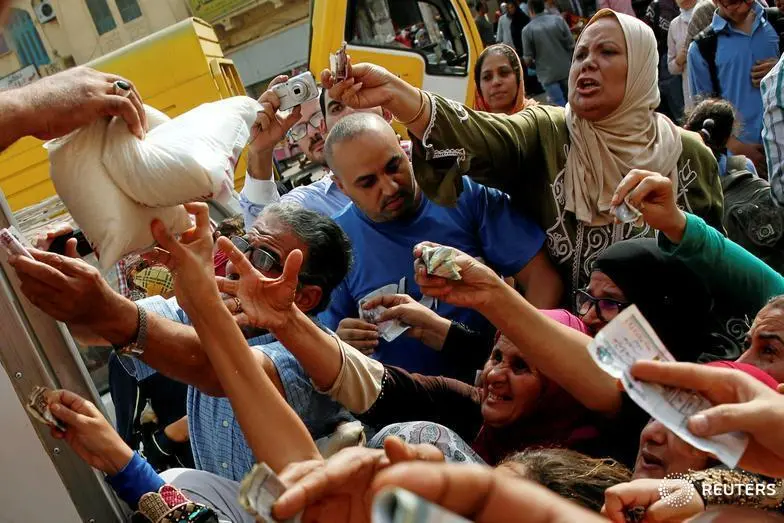PHOTO
By Tamer Hafez
Up until a couple of months ago, Sanaa Mahmoud, a 39-year-old housewife who lives in Ard el Lewa, an informal neighborhood near Mohandeseen, was able to buy seven or eight kilograms of state-subsidized sugar every month from her local outlet. As well as helping to feed her family of seven, Mahmoud used the cheap sugar to bake cakes for sale at her husband’s local grocery. “The extra money helped us a lot,” she says. But in September, the government slashed the individual allowance for subsidized sugar by half, meaning Mahmoud was only eligible to buy three kilos for the month. That means that to continue baking her cakes, Mahmoud would have to buy sugar at the current market price of around LE 9 per kilo—a cost she says would erase her profits.
Still, officials had little choice but to slash the subsidized sugar allowance in the face of dwindling supplies, which are down by some 75 percent, according to Milad Mina, manager of the Ard el Lewa subsidized foods outlet. “Now we get just enough sugar to supply only 500 of the 2,000 people who come to the outlet during the month,” he says. Nor is sugar the only staple that’s running short in recent months. Cooking oil and rice have also been disappearing from shelves, especially in state-run outlets for the poor, as the ongoing hard currency shortage has exacerbated a lawless supply chain rife with market manipulation. Industry insiders say traders in search of dollars are exporting semi-finished goods, while others have been hoarding, driving up local market prices.
“In June, we calculated that all state-owned sugar refineries would have no raw sugar in November and December if the Ministry of Supply couldn’t get us more,” says Abdul Hamid Salama, chairman and managing director of the state-owned Delta Sugar Co., which produces refined sugar from beets. With the government cracking down on the forex black market, it’s been increasingly difficult to source dollars in order to pay for imports, while the government has directed banks to reserve their precious greenbacks for crucial commodities. While sugar is considered a staple, it’s below wheat, oil and other critical items on the priorities list. If this state of affairs continues, the local sugar industry could be in trouble. This wouldn’t just hurt consumers like Mahmoud, it could jeopardize sweet shops, bakers and factories that rely on sugar as a key raw material.
Like many basic commodities in Egypt, sugar production is predominantly controlled by the government, which owns all eight of Egypt’s sugar cane refineries and four of the six factories that process beet sugar, running some 75 percent of the country’s production. Egypt produces 2.4 million tons of sugar annually, 1.3 million tons coming from beets and 1.1 million from sugar cane, while consumption over the past two years has remained stable at between 3 and 3.2 million tons per year, according to Central Bank figures. “So anyone would expect that we would only import 700,000 to 800,000 tons to cover our shortage,” says Salama, adding that the cost of these imports should also be lower than usual as global sugar prices are down. Between 2011 and 2015, the price of sugar dropped from $600 a ton to a low of $200 a ton in August 2015, according to the New York Mercantile Exchange. It has since crept back up to around $400.
As state-owned local producers have seen their costs top LE 4,000 per ton of refined sugar thanks to inefficient and outdated machinery and methods and reduced economies of scale, imported sugar got cheaper. As a result, in 2014 and 2015, Egypt imported around 1.3 million tons of sugar annually, while domestic sugar producers stockpiled their unsold stock in storage facilities.
The problem starts in the fields, explains Salama, where sugar beet and cane production is dominated by small farmers who lack the modern equipment and high-yield seeds that would enable them to boost profits. Sugar cane cultivation is down from 330,000 acres in 2015 to 280,000 acres this year, according to Farid Wasel, head of the Farmers and Agricultural Producers Syndicate. In the developed world, the syndicate head points out, government-supported seed and cultivation research has helped farmers increase their yields, while Egyptian farmers continue to rely on subsidized fertilizer and seeds.
Farmers prefer to deal with large traders who can buy their entire harvest and offer more competitive prices. The same goes for state-owned factories, which also rely on middlemen. Unfortunately, this state of affairs gives these traders a lot of power. “I think that there are a total of eight traders who control this entire process. So it’s very easy for them to manipulate the market by controlling how much sugar passes through each stage,” says Amr Asfour, deputy chairman of the food products and commodities division in the Cairo Chamber of Commerce.
By June, production at all state-owned refineries was about a million tons below its annual production target. Industry insiders blame traders for hoarding sugar as well as exporting rather than selling to the local market, as the global price of sugar has slowly crept up again. “Traders want foreign currency,” says Salama. While Egypt was forced to import sugar between June and August, some 250,000 tons of raw and refined sugar were sold abroad, according to the General Organization for Export & Import Control. In early September, the government slapped a LE 900 per ton fee on all sugar exports to stem the outflow. “This calmed exports a bit, but they are still high relative to the shortage in the domestic market,” says Salama.
Meanwhile, with sugar in short supply, the local retail price jumped 64 percent between early July and late September, from LE 5.5 to LE 9 per kilogram currently. “Import restrictions added to the demand for locally produced sugar, and local companies were not able to increase production to cope,” says Khaled Fathallah, deputy head of the Alexandria Chamber of Commerce. “You ended up with more expensive sugar and a scarcer supply.”
Meanwhile, the high price of sugar has pushed more consumers to government discount-food outlets. “At the start of September, we were pumping 150 tons a day into our outlets,” says Adel el Khatib, chairman of Al Ahram Consumer Outlets Co., a state-owned chain that sells subsidized goods. “Sugar is disappearing off the shelves every day,” says Khatib. In response, the General Authority for Supply Commodities, which oversees subsidized food outlets, cut the per person sugar allowance from two or three kilos per person to one to prevent hoarding.
Adding to the supply shortage crisis is the Gam’ety program, launched in late 2015 with the aim of increasing consumer access to affordable, semi-subsidized goods. Under this Ministry of Supply initiative, certified private sector outlets receive priority to purchase state-produced sugar and other commodities at cost on the condition that they sell at a government-approved price that’s higher than at the outlets but below the free market. However, the program backfired, “because at the first signs of a shortage, the Gam’ety outlets purchased large quantities of sugar,” says Ahmed Bakr, a member of the grocers division at the Mansoura Chamber of Commerce. “Their panic helped exacerbate the shortage.”
All this has led to price volatility in a jittery market, as shortages have also put private-sector retailers under pressure. At least two major supermarket chains, Ragab Sons and Carrefour, sugar prices have been fluctuating weekly in response to news and rumors. “We sometimes change the price on a daily basis because we received worrying news midday,” says a stock supervisor at a Carrefour outlet in Cairo. He explains that while the chain prides itself on selling goods slightly below the market retail price, they can’t go too low or the chain will face a run on the product as people buy up their cheap sugar to resell at a profit. At the end of the day, “No one benefits from a manipulated market,” says the source. He also noted that in recent weeks, cheaper sugar brands had been in noticeably short supply. “I have been hearing that many of those sugar-packaging firms are reducing output because of the higher prices,” says the Carrefour employee.
Meanwhile, producers of packaged sweets are facing rising costs and supply issues, says Hassan el Fendi, managing director of Freedom Food Industries (Freedom 2000) and head of the Sugar Industries Division in the Food Industries Chamber of the Federation of Egyptian Industries. “We saw a massive drop in sugar production and imports happen in August. But because factories usually order ahead of time, it might be a few weeks or months before the higher prices are translated to the consumer,” says Fendi. Ahmed el Rashidi, managing director of packaged dessert producer El Rashidi El Mizan, says the firm had to pay LE 6,500 per ton of sugar in September, compared to LE 4,000 per ton for the July delivery. “We really have no option but to transfer this added cost to the consumer,” says Rashidi.
Other sweeteners, like honey, are also likely to rise: Sugar is the most expensive component in refining Egyptian honey for the consumer market. In Gharbia governorate, Egypt’s honey-producing hub, sugar is now selling at LE 7,000 a ton, and the steep cost has driven many small honey makers permanently out of business, says Fouad Badran, chairman of the Honey Makers Association, a local industry group. “This is adding a lot of cost pressure,” says Badran. While many of Gharbia’s honey makers export their products in exchange for hard currency, their success has been based on access to cheap sugar. “If they have to buy imported sugar, their products will become too expensive to be competitive,” says Badran.
To address the shortage, the government announced in September that it will sell 50,000 tons of imported raw sugar to state-owned companies starting in October, with plans to import another 700,000 tons down the line. But Salama, for one, is skeptical that the state will be able to execute these plans on time, given the dollar shortage.
The fast moving consumer goods section of the Federation of Egyptian Industries is pushing the Ministry of Supply and the Food Industries Holding Co.—the umbrella firm that oversees all state-owned sugar factories—to require greater transparency at various stages in the supply chain and to do away with middlemen. “We really need to find a different way of moving sugar from farmer to refinery to customers,” says Rashidi. “We can’t operate with such a high risk of sudden price hikes to an essential raw material in our industry.”
Others in the industry agree that throwing money at the problem for additional imports will only be a Band-aid on a broken system that desperately needs better oversight. Says Salama: “I feel that the state is just as surprised as we are when a crisis happens.”
© Business Monthly 2016





















